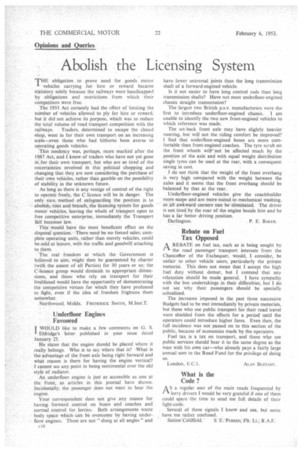Abolish the Licensing System
Page 54

If you've noticed an error in this article please click here to report it so we can fix it.
THE obligation to prove need for goods motor vehicles carrying for hire or reward became statutory solely because the railways were handicapped by obligations and restrictions from which their competitors were free.
The 1933 Act certainly had the effect of limiting the number of vehicles allowed to ply for hire or reward, but it did not achieve its purpose, which was to reduce the total volume of road transport competition with the railways. Traders, determined to escape the closed shop, went in for their own transport on an increasing scale—even those who had hitherto been averse to operating goods vehicles.
This tendency was, perhaps, more marked after the 1947 Act, and I know of traders who have not yet gone in for their own transport, but who are so tired of the uncertainties involved in this political chopping and changing that they are now considering the purchase of their own vehicles, rather than gamble on the possibility of stability in the unknown future.
As long as there is any vestige of control of the right to operate freely, the C licence will be in danger. The only sure method of safeguarding the position is to abolish, root and branch, the licensing system for goods motor vehicles, leaving the whole of transport open to free competitive enterprise, immediately the Transport Bill becomes law.
This would have the most beneficent effect on the disposal question. There need be no forced sales; complete operating units, rather than merely vehicles, could be sold at leisure, with the traffic and goodwill attaching to them.
The real freedom at which the Government is believed to aim, might then be guaranteed by charter (with the assent of all Parties) for 30 years or so; the C-licence group would diminish to appropriate dimensions, and those who rely on transport for their livelihood would have the opportunity of demonstrating the competitive virtues for which they have professed to fight, even if the idea of freedom frightens them somewhat.
Northwood, Middx. FREDERICK SMITH,
Underfloor Engines Favoured
I WOULD like to make a few comments on G. S. I Eldridge's letter published in your issue dated January 23.
He states that the engine should be placed where it really belongs. Who is to say where that is? What is
the advantage of the front axle being right forward and what reason is there for having the engine vertical? cannot see any point in being sentimental over the old style of radiator.
An underfloor engine is just as accessible as one at the front, as articles in this journal have shown. Incidentally, the passenger does not want to hear the engine.
Your correspondent does not give any reason for having forwardcontrol on buses and coaches and normal control for lorries. Both arrangements waste body space which can be overcome by having under-. floor engines. These are not "slung at all angles" and
c16
have fewer universal joints than the long transmission shaft of a forward-engined vehicle.
Is it not easier to have long control rods than long transmission shafts? Have not most underfloor-enginecl chassis straight transmission?
The largest two British p.s.v. manufacturers were the first to introduce underfloor-engined chassis. I am unable to identify the two new front-engined vehicles to which reference was made.
The set-back front axle may have slightly heavier steering, but will not the riding comfort be improved? I find that underfloor-engined buses are more comfortable than front-ertgined coaches. The tyre scrub on the front wheels willo not be affected much by the position of the axle and with equal weight distribution single tyres can be used at the rear, with a consequent saving in cost. I do not think that the weight of the front overhang is very high compared with the weight between the axles and it seems that the front overhang should be balanced by that at the rear. Underfloor-engined vehicles give the coachbuilder more scope and are more suited-to-mechanical washing, as all awkward corners can be eliminated. The driver is not tired by the roar of the engine beside him and he has a far better driving position. Darlington. P. E. BAKER.
Rebate on Fuel Tax Opposed
AREBATE on fuel tax, such as is being sought by the road passenger transport interests from the Chancellor of the Exchequer, would, I consider, be unfair to other vehicle users, particularly the private motorist. This does not mean that I accept the high fuel duty without demur, but I contend that any relaxation should be made general. I have sympathy with the bus undertakings in their difficulties, but I do not see why their passengers should be specially subsidized.
The increases imposed in the past three successive
• Budgets had to be met immediately by private motorists, but those who use public transport for their road travel were shielded from the effects for a period until the operators could introduce higher fares. Even then, the full incidence was not passed on to this section of the public, because of economies made by the operators. Fuel tax is a tax on transport, and those who use public services should bear it to the same degree as the man with his own car—who already pays a fairly large annual sum to the Road Fund for the privilege of doing SO.
London, E.C.1. ALAN BEZZANT.
What is the Code ?
AS a regular user of the main roads frequented by lorry drivers I would be very grateful if one of them could spare the time to send me full details of their light-code.
• Several of these signals I know and use, but some have me rather confused. . . .
SuttonCalfield. S. E: PERRIN, Flt. Lt., R A. F.




























































































